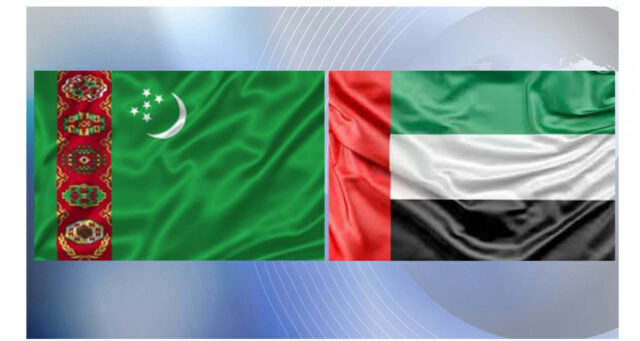Analysis of UAE Interests in Turkmenistan and Central Asia

Geopolitical Report ISSN 2785-2598 Volume 39 Issue 5
SpecialEurasia OSINT Team
The recent meeting between representatives of Turkmenistan and the United Arab Emirates (UAE) underscored the positive trajectory of their bilateral relations, encompassing political, trade-economic, and cultural-humanitarian domains.
Both parties expressed a shared commitment to expanding their trade-economic partnership, and the visit of the Turkmen delegation to the UAE signifies a continued effort to strengthen these ties.
On a broader geopolitical scale, the Gulf Arab countries, led by the UAE, Saudi Arabia and Qatar, have actively pursued increased influence in the region. In this context, Abu Dhabi’s foreign policy underscores the growing significance of the Central Asian republics within the UAE’s strategic considerations on the Eurasian geopolitical chessboard.
Background Information
On February 11th, 2024, during the visit of the Turkmenistan’s delegation in Abu Dhabi, Turkmen Minister of Foreign Affairs and Deputy Chairman of the Cabinet of Minister Rashid Meredov met with the Emirati the Vice-President, Deputy Prime Minister, Chairman of the Presidential Court of the United Arab Emirates Sheikh Mansour bin Zayed Al Nahyan.
The parties discussed cooperation in natural gas, electricity, renewable energy, and transport-logistics and expressed intentions to further expand trade-economic collaboration.
The UAE are highly interested in expanding their involvement in Turkmenistan’s energy sector, encompassing the oil and gas industry and the renewable energy sphere, through substantial investments from companies like ADNOC, Dragon Oil, and Masdar.
In particular, Dragon Oil has been a leading investor in Turkmenistan’s economy, having invested approximately $8 billion since 1999 in the development of the country’s Caspian Sea shelf.
In 2022, the trade volume between the two countries reached around $1.3 billion (excluding oil trade), marking an almost 50% increase compared to the previous year. In 2021, the Abu Dhabi Development Fund established a joint investment company with Turkmenistan, with a targeted capital of $100 million.
Read more | Geopolitics of UAE investments in Central Asia |
Geopolitical Scenario
Central Asia has emerged as a key player in the Eurasian geopolitical landscape and the global stage, especially since the dissolution of the Soviet Union in 1991. The independence of the Central Asian republics has attracted the attention of global powers, including Russia, China, Turkey, Iran, the United States, and certain EU member states.
Notably, the Gulf Arab countries have actively sought to bolster their influence in the region. Amid the competition with other regional players, the UAE’s foreign policy towards Central Asia, particularly the Central Asian republics, has acquired prominence.
Abu Dhabi’s foreign policy demonstrates the growing importance of the Central Asian republics in the UAE’s strategic plans. The rivalry with Turkey and Iran in the areas of religion, economy, and energy, combined with Abu Dhabi’s strategic presence in the Middle East, North Africa, and Central Asia, showcases the diverse nature of its engagement.
The Gulf monarchy has used its financial resources strategically to strengthen its influence in Central Asia. Through investments and trade, it has emerged as a significant player in the economic growth of the local republics.
The UAE’s focus on Turkmenistan shows its broader strategies in Central Asia, prioritising countries abundant in natural resources, specifically natural gas.
Through its sovereign wealth fund, Mubadala, the Arab country has invested significantly in Central Asia, particularly in energy and port infrastructure projects. This underscores Abu Dhabi’s commitment to playing a substantial role in shaping the economic landscape of the Central Asian region.
The “Central Asia + GCC” summit, held in July 2023 in Saudi Arabia, confirmed a new geopolitical alignment and major projects in the region. This summit has drawn attention from external international players and regional actors.
The Gulf Cooperation Council (GCC) is now working towards adopting a unified approach in its interactions with Central Asian countries, departing from the historical trend of individual projects pursued independently by the Gulf states.
The religious aspect of Islam acts as a cohesive element connecting the Persian Gulf and Central Asia, although the geographical separation has historically posed challenges to the Gulf countries’ competitiveness in the region.
Read more | Geopolitics in Action: How the “Central Asia + GCC” Summit Is Redefining Regional Dynamics |
Risk Analysis
Despite the positive trajectory in the relationship between Turkmenistan and the United Arab Emirates, stakeholders should weigh certain risks to ensure the sustainability of their engagement. One significant risk lies in the geopolitical complexities of the Central Asian region, with multiple global powers vying for influence.
The ongoing rivalry between the UAE, Turkey, and Iran in the religious, economic, and energy spheres could introduce volatility and strain relations, particularly if competition intensifies.
Another critical consideration is the economic dependency on the energy sector. The UAE’s substantial investments in Turkmenistan’s energy industry, particularly in natural gas and oil, expose both nations to potential market fluctuations and geopolitical tensions affecting global energy markets. A sudden downturn in oil prices or disruptions in energy trade routes could affect the economic viability of these investments.
Moreover, the UAE and other Gulf Arab monarchies might face opposition from Russia and China if they choose to invest in local businesses and infrastructure projects and strengthen their presence in the region. This is because Moscow and Beijing have significant involvement in the political, economic, and military dynamics of Central Asia.
The rivalry between international and regional key players could worsen the local situation, leading to instability and putting pressure on local governments. As a result, this could also impact the business and investment climates.
For those with an interest in acquiring comprehensive insights into political and economic dynamics of the UAE interests in Turkmenistan and Central Asia, we encourage you to reach out to our team by sending an email to info@specialeurasia.com. We are poised to facilitate an assessment of the opportunity for you to obtain a meticulously crafted and specialised report tailored to your intelligence needs.
